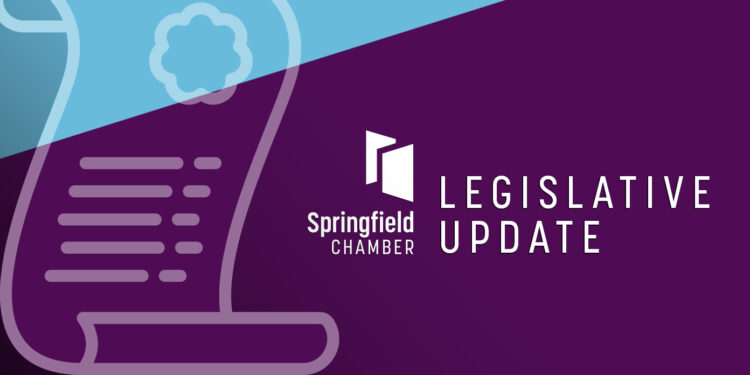Legislative Update: May 20, 2025

The Springfield Area Chamber of Commerce continues to monitor updates from the state legislative session, with two bills on the Chamber’s Policy Agenda moving unfavorably for the business community (Senate Bills 426 and 916).
Learn more about how to take action on these two bills below, plus an update on the delay of the Advanced Clean Trucks ruling and the May Revenue Forecast which was released on May 14.
TAKE ACTION THIS WEEK: SB 426 – General Contractor Liability; SB 916 – Unemployment Insurance for Striking Workers
**Please note that scheduled hearings, sessions, and votes are all subject to change. The Springfield Chamber will work to update information as changes occur.**
ACTION ALERT!
General Contractor Liability (SB 426)
SB 426 was referred to the floor with a -22 amendment on Monday afternoon and a do pass recommendation. The floor vote isn’t scheduled at this time.
The Springfield Area Chamber of Commerce has voiced its OPPOSITION to Senate Bill 426, citing concerns over unintended consequences for businesses, contractors and workers.
READ THE CHAMBER’S PREVIOUS LETTER OF OPPOSITION HERE.
The comment period is now closed on the bill, so OSCC recommends all communication will need to be directed to individual legislators – specifically all House Democrats and Republican Greg Smith (R-Heppner).
ACTION ALERT!
Unemployment Insurance for
Striking Workers (SB 916)
The SB 916 work session was carried over until Wednesday.
The Springfield Chamber has identified Senate Bill 916 as one of the most important labor bills in the current session, and therefore has submitted testimony OPPOSING the bill.
READ THE CHAMBER’S TESTIMONY HERE.
Public testimony is closed; contact the members of the House Committee on Labor and Workplace Standards directly and/or your individual legislators to voice opposition to this bill.
KEY POLICY UPDATES: Tracking our 2025 Legislative Priorities
Legislative developments impacting the Chamber’s 2025 Legislative Policy Agenda, are unfolding.
Clean Lane Land Use Preemption Bill
(HB 3971)
The Springfield Chamber has added House Bill 3971 to their list of bills to MONITOR.
HB 3971 would allow Lane County to approve land use applications for the development of mixed-waste processing facilities on specified lands, overriding local discretionary review. The bill includes an emergency clause, making it effective immediately upon passage. The Chamber is monitoring the bill closely due to concerns about its potential to bypass public input and local review processes. Should the county decide to move forward with this complex and costly project, the bill would allow it to do so without a public hearing—even in the face of both community support and skepticism. The Chamber’s concerns with the project encompass potential economic impacts, including increased costs to residential and commercial consumers.
Advanced Clean Trucks rules delayed
The Oregon Department of Environmental Quality has announced a two-year delay in enforcing its Advanced Clean Trucks Rules, which would have required rising sales of zero-emission medium- and heavy-duty vehicles starting in 2025. Enforcement will now begin with the 2027 model year, following pressure from affected businesses and bipartisan support in the Legislature. Industry leaders, including Eugene-based Papé Group and Portland’s Daimler Truck North America, raised significant concerns about the feasibility and cost of the rule, given current technology and infrastructure constraints. The Chamber will continue monitoring efforts to balance environmental goals with economic realities and advocate for practical regulatory solutions.
May Revenue Forecast released
Oregon’s May 14 revenue forecast projects a slight dip in expected collections for the 2023-25 and 2025-27 biennia, though the state still anticipates billions more than originally budgeted. Legislators will rely on this forecast to shape the 2025-27 state budget in the final weeks of the current session. While Oregon’s economic growth continues to lag behind national trends—due in part to stagnant population growth and a slowdown in manufacturing—the forecast predicts a return to normal growth by 2026. The Chamber remains focused on advocating for policies that strengthen Oregon’s competitiveness and support long-term economic vitality.
GET ENGAGED: Help the Springfield Area Chamber of Commerce build a thriving business climate
Beyond our formal policy agenda, we’re monitoring workforce, education, and community issues that impact Springfield. Here’s what’s coming up.
Add your voice to the
Business Climate Survey
The purpose of the Business Climate Survey is to track trends and issues affecting businesses. Business decision makers are surveyed to identify emerging issues that may be addressed by the Springfield Chamber. Aggregate data will be shared with community stakeholders, elected officials, and used by the Chamber for developing our advocacy and program priorities. Include your email at the end of the survey to receive a copy of the final results. Your name and organization will remain confidential.
Take the National Business Leaders Survey
The National Association of State Chambers, in collaboration with the Siena College Research Institute, is inviting business leaders to share their voices through the National Business Leaders Survey. This survey is open to businesses of any size and in any industry. This survey is designed to gather real insights into how businesses are feeling about today’s economic climate — both across the country and right here in Oregon.
Take the survey here: http://www.siena.edu/scri/NASC2025
The deadline to complete the survey is June 30th.
The Springfield Area Chamber of Commerce is monitoring all this legislation closely as part of its advocacy for policies that support a stable and predictable business environment. The Chamber will continue advocating for policies that support a strong, competitive business environment in Springfield and beyond. Stay tuned for updates in The Bottom Line.
- View Oregon State Chamber of Commerce’s updates in their newsletter from Monday, May 19 here.
- Read Oregon Business and Industry’s Capitol Connect newsletter from Monday, May 19 here.
Springfield Area Chamber of Commerce Business Advocacy
The Springfield Area Chamber of Commerce is a trusted convener and provider of business resources. They recognize the systemic interdependencies of a healthy economy and provide an ear and a voice for local business at the confluence of government, commerce, and community. They advocate for business by increasing visibility, dialogue, and representation at local, state, and federal policy circles around issues of impact and interest to their members. Learn more about the Chamber’s Business Advocacy work.
Discover more from Springfield Bottom Line
Subscribe to get the latest posts sent to your email.






